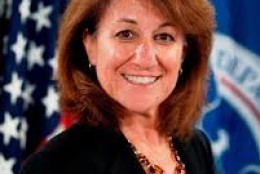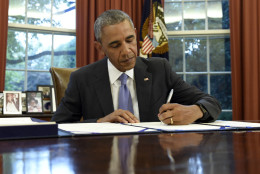Open Data/Transparency
-
Few American cities are blanketed in smog any more. But just because New York isn't Beijing doesn't mean there's no room to improve air quality. That's why the EPA is launching a challenge to cities and towns across the country to develop plans for using air quality sensors in a big data sort of way. Robin Thottungal, the EPA's chief data scientist and director of analytics, joins the Federal Drive with Tom Temin with more.
September 21, 2016 -
What really happens during presidential transitions? For a view of how to make transition more open and transparent, as part of our continuing series, Tracking the Transition. Federal Drive with Tom Temin turns to Alex Howard, senior analyst at the Sunlight Foundation.
September 20, 2016 -
The Department of Health and Human Services stood up its Idea Lab in 2013 to establish and build on a culture of innovation within the department.
September 14, 2016 -
Legislators came out strongly in favor of the Digital Accountability and Transparency Act (DATA Act) in the 2017 spending bills.
September 06, 2016 -
The new DHS program helps researchers collect data sets and test scenarios for potential cyber-related infrastructure events.
August 18, 2016 -
The Coalition for Government Procurement wrote a letter to GSA senior procurement executive Jeff Koses asking for a delay in the Transactional Data Reporting pilot.
August 12, 2016 -
A new policy from the Office of Management and Budget sets agencies on a path toward sharing new, custom-developed source code across government. The goal is to cut back on the $6 billion agencies spend annually on new software.
August 09, 2016 -
The Government Accountability Office says the implementation of the Digital Accountability and Transparency Act needs improvement, as the Treasury Department works to finalize a system to collect agency data and make sure it is in the same format.
August 03, 2016 -
Full implementation of the DATA Act is at risk if the Treasury Department and Office of Management and Budget don't start keeping better tabs on agencies and their spending reports, says the Government Accountability Office.
July 29, 2016 -
Ivor D’Souza, the chief information officer of the National Institutes of Health’s National Library of Medicine, said an interagency effort to cut the time it takes to connect the dots during an outbreak is paying off.
July 15, 2016 -
The Freedom of Information Act just turned 50. Journalists, lawyers and others are largely applauding the new FOIA Improvement Act of 2016, which President Barack Obama signed into law at the end of June. But there's still a lot more work to be done to improve the way agencies give information to the public. Open government experts say agencies need more help from Congress to create a culture of openness and transparency. Federal News Radio's Nicole Ogrysko offers more on the subject on Federal Drive with Tom Temin.
July 13, 2016 -
Hillary Clinton's technology and innovation initiative pledges a more modern and open digital government. The policy plan also supports the creation of more STEM jobs and increased internet access.
July 07, 2016 -
Karen Neuman, the Homeland Security Department’s chief privacy officer, will step down at the end of July after three years on the job.
July 07, 2016 -
The White House also released new initiatives to improve agency response to records requests, including tasking the new Chief FOIA Officers Council to identify and address the biggest difficulties in complying with the law and OMB will issue new openness and transparency guidance.
June 30, 2016 -
Dan Katz, technical director for the public sector at Acquia, makes the case for cloud platforms and open source software for digital experience management as a way for agencies to more easily and quickly migrate to a digital environment.
June 20, 2016















